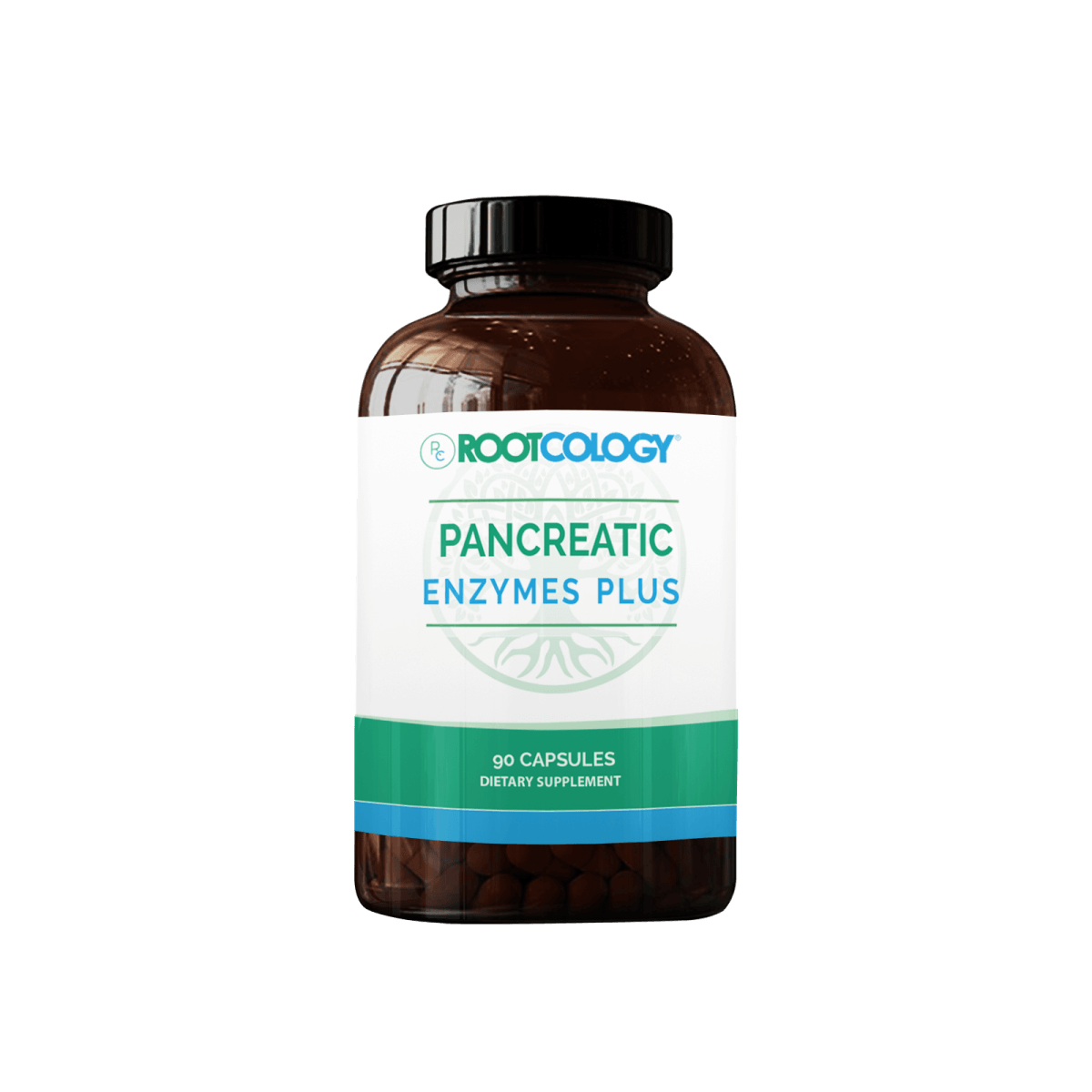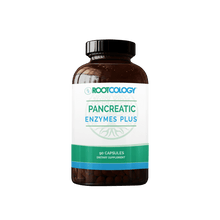What are the ingredients in Rootcology Pancreatic Enzymes Plus?
This formula is a blend of pancreatic enzymes (lipase, protease, amylase), desiccated ox bile and bromelain. The enteric coating protects the enzymes from being denatured by stomach acid, preserving their activity for the duodenum (first section of small intestine), where pancreatic enzymes are normally released and are intended to function. It is free of dairy, gluten, soy, and artificial fillers.
What are the benefits of Pancreatic Enzymes Plus?
Pancreatic Enzyme Plus may be beneficial for those looking to support pancreatic function and fat digestion, as well as people who experience occasional bloating, gas, or GI distress.*
What is the recommended dose?
One capsule, three times per day with each meal, is recommended.
How long can I take Pancreatic Enzymes Plus for?
Pancreatic Enzymes Plus can be taken long term, if needed.
Can Pancreatic Enzymes Plus be taken with thyroid medications?
Yes, Pancreatic Enzymes Plus is safe to take with thyroid medications, but be sure to space them out by at least one hour.
Are there any side effects I should be aware of when taking Pancreatic Enzymes?
The most common side effects include: increased (hyperglycemia) or decreased (hypoglycemia) blood sugars, abdominal area pain, frequent or abnormal bowel movements, gas, vomiting, dizziness, or sore throat and cough.
Do not use if you are allergic or sensitive to pork, pineapples, or any of the ingredients in this supplement. If you experience a skin rash, please discontinue the product immediately as this could be a sign of an allergic reaction.
Consult with a physician before use if pregnant or breastfeeding.
DO NOT TAKE if taking the following medications: acarbose, tetracycline antibiotics, indomethacin (Indocin), amoxicillin, Creon (pancrelipase capsules), any anticoagulant or blood thinning drugs such as aspirin, dalteparin (Fragmin), enoxaparin (Lovenox), heparin, ticlopidine (Ticlid), warfarin, and/or clopidogrel (Plavix).
Burning and digestive distress would likely indicate that the supplement should be discontinued. Do not crush or chew capsules or its contents, and do not hold the capsule or capsule contents in your mouth, as they may cause irritation.
- Waldum HL, Kleveland PM, Sørdal ØF. Helicobacter pylori and gastric acid: an intimate and reciprocal relationship. Therap Adv Gastroenterol. 2016;9(6):836–844.
- Struyvenberg MR, Martin CR, Freedman SD. Practical guide to exocrine pancreatic insufficiency – Breaking the myths. BMC Med. 2017;15(1):29. Published 2017 Feb 10.
- Daher R, Yazbeck T, Jaoude JB, Abboud B. Consequences of dysthyroidism on the digestive tract and viscera. World J Gastroenterol. 2009;15(23):2834–2838.
- Goldin E, Wengrower D. Diarrhea in hypothyroidism: bacterial overgrowth as a possible etiology. J Clin Gastroenterol. 1990 Feb;12(1):98-9.
- Chen C, Xie Z, Shen Y, Xia S.F. The Roles of Thyroid and Thyroid Hormone in Pancreas: Physiology and Pathology. International Journal of Endocrinology. 2018;1.
- Gullo L, Pezzilli R, Bellanova B, D’Ambrosi A, Alvisi V, Barbara L. Influence of the thyroid on exocrine pancreatic function. Gastroenterology. 1991 May;100(5Pt 1):1392-6.
- Lipski L. Remove, Replace and Replenish: The Diet Prescription and Supplementation – Part 2. Presented as part of the 2017 Institute for Functional Medicine Conference; October 2017; Denver, CO.
You May Also Like
Questions about Rootcology Products? Email info@rootcology.com and we will get back to you within 24 business hours.














